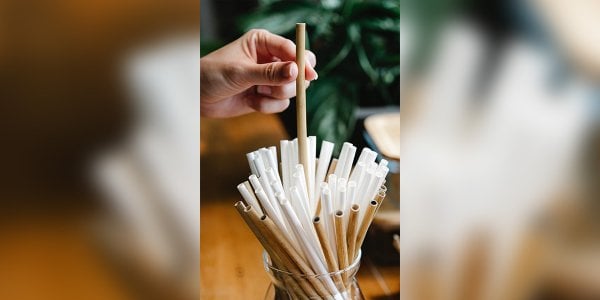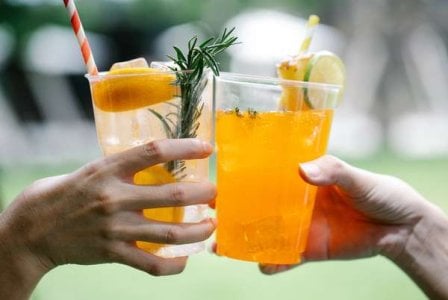Discover this shocking truth about 'forever chemicals' in your paper and bamboo straws
Some like to do their bit for the environment, and part of that is reducing single-use plastic waste. This is why many are switching to paper or bamboo straws, which are touted as more sustainable options than their plastic counterparts.
However, recent research has revealed that some paper and bamboo straws may be more harmful than plastic straws.
Scientists at the University of Antwerp in Belgium tested straws from several stores and fast-food outlets and discovered that 27 out of 39 brands contained so-called 'forever chemicals'.
These are a group of synthetic chemicals called per- and polyfluoroalkyl substances, or PFAS. They’re often used to manufacture consumer products as they can resist stains, grease and water.
Although the concentration levels found in the study were low, these chemicals have been linked to low birth weight, high cholesterol, thyroid disease, and an increased risk of various types of cancers that can affect the liver and kidneys.
However, scientists are still trying to determine exactly how much they’re hazardous to our health.
Graham Peaslee, who studies PFAS at the University of Notre Dame, weighed in on the subject. While he was not involved in the new research, he said it’s possible manufacturers aren’t testing for the chemicals in their products.
‘All the straw manufacturers should take warning and say, “Hey, do we use this stuff?” Because, at the moment, they’re not even asking that question,’ Peaslee exclaimed.
The PFAS-containing samples proved to be overwhelmingly paper straws (18 out of 20 brands), while four out of five bamboo straws, three out of four plastic straws, and two out of five glass straws also tested positive.
The only group of straws that were completely PFAS-free were stainless steel straws.
This is not the first study into the presence of PFAS in paper and bamboo straws. Similar research has been conducted in Australia and the US.
In Australia, the government recommends that people follow the precautionary health advice their state or territory health authorities provide regarding PFAS.
You may read more about the PFAS through the task force here.
It’s important to note that researchers are still trying to determine whether and how much PFAS leaches out of straws into beverages.
Thimo Groffen, an author of the new study and environmental scientist at the University of Antwerp, said: ‘This is just one very small source of additional exposure which could be easily avoided, but I don’t expect straws themselves to be very harmful.’
He also mentioned that PFAS can accumulate in the body, and people should reduce exposure wherever possible.
‘It all adds up together with other exposure routes, and the combination could cause health effects,’ he added.
Meanwhile, Peaslee also agreed that the PFAS transfer from food and packaging is ‘generally minimal’.
‘If you let a straw sit for a day, you’ll get some in the water, but how many of us leave our straw in the water for a day and then still drink out of it?’ he asked.
More than the health risks, there is also the impact that paper and bamboo straws could have on the environment.
Plastic straws are still a severe environmental threat due to them not decomposing quickly and becoming litter that contaminates our oceans, rivers, lakes and streams–and, of course, they could harm marine mammals.
However, with this new study, concerns about PFAS contamination from the alternatives have been highlighted. Peaslee said: ‘If [paper straws] come with PFAS on them, they’re not so eco-friendly anymore.’
PFAS can leach out of landfills into water and soil and can have toxic effects on animals–which include liver and reproductive issues.
What can we do then? Groffen said that people could instead use plant-based straws and stainless steel straws.
‘I still would expect plastic straws to be more harmful to the environment because, of course, you also have the degradation of the plastics into microplastics that can be consumed by animals.’

What do you think of this story, members? Do you prefer paper, bamboo or plastic straws? Let us know in the comments!
However, recent research has revealed that some paper and bamboo straws may be more harmful than plastic straws.
Scientists at the University of Antwerp in Belgium tested straws from several stores and fast-food outlets and discovered that 27 out of 39 brands contained so-called 'forever chemicals'.
These are a group of synthetic chemicals called per- and polyfluoroalkyl substances, or PFAS. They’re often used to manufacture consumer products as they can resist stains, grease and water.
Although the concentration levels found in the study were low, these chemicals have been linked to low birth weight, high cholesterol, thyroid disease, and an increased risk of various types of cancers that can affect the liver and kidneys.
However, scientists are still trying to determine exactly how much they’re hazardous to our health.
Graham Peaslee, who studies PFAS at the University of Notre Dame, weighed in on the subject. While he was not involved in the new research, he said it’s possible manufacturers aren’t testing for the chemicals in their products.
‘All the straw manufacturers should take warning and say, “Hey, do we use this stuff?” Because, at the moment, they’re not even asking that question,’ Peaslee exclaimed.
The PFAS-containing samples proved to be overwhelmingly paper straws (18 out of 20 brands), while four out of five bamboo straws, three out of four plastic straws, and two out of five glass straws also tested positive.
The only group of straws that were completely PFAS-free were stainless steel straws.
This is not the first study into the presence of PFAS in paper and bamboo straws. Similar research has been conducted in Australia and the US.
In Australia, the government recommends that people follow the precautionary health advice their state or territory health authorities provide regarding PFAS.
You may read more about the PFAS through the task force here.
It’s important to note that researchers are still trying to determine whether and how much PFAS leaches out of straws into beverages.
Thimo Groffen, an author of the new study and environmental scientist at the University of Antwerp, said: ‘This is just one very small source of additional exposure which could be easily avoided, but I don’t expect straws themselves to be very harmful.’
He also mentioned that PFAS can accumulate in the body, and people should reduce exposure wherever possible.
‘It all adds up together with other exposure routes, and the combination could cause health effects,’ he added.
Meanwhile, Peaslee also agreed that the PFAS transfer from food and packaging is ‘generally minimal’.
‘If you let a straw sit for a day, you’ll get some in the water, but how many of us leave our straw in the water for a day and then still drink out of it?’ he asked.
More than the health risks, there is also the impact that paper and bamboo straws could have on the environment.
Plastic straws are still a severe environmental threat due to them not decomposing quickly and becoming litter that contaminates our oceans, rivers, lakes and streams–and, of course, they could harm marine mammals.
However, with this new study, concerns about PFAS contamination from the alternatives have been highlighted. Peaslee said: ‘If [paper straws] come with PFAS on them, they’re not so eco-friendly anymore.’
PFAS can leach out of landfills into water and soil and can have toxic effects on animals–which include liver and reproductive issues.
What can we do then? Groffen said that people could instead use plant-based straws and stainless steel straws.
‘I still would expect plastic straws to be more harmful to the environment because, of course, you also have the degradation of the plastics into microplastics that can be consumed by animals.’
Key Takeaways
- Scientists in Belgium have found that some paper and bamboo straws contain PFAS, commonly known as 'forever chemicals' that can resist stains, grease and water.
- Out of 39 brands of different materials straw sampled, 27 were found to contain PFAS, the highest incidence was found in paper and bamboo straws.
- The health risks of PFAS include low birth weight, high cholesterol, thyroid disease and an increased risk of kidney and liver cancers, but the safe levels of exposure have not yet been determined.
- The Australian government recommends that people follow the precautionary health advice provided by their state or territory health authorities regarding PFAS.
- While the study points out the presence of PFAS in paper and bamboo straws, the researchers still view plant-based straws and stainless steel straws as a better alternative to plastic straws due to the harmful degradation of plastics into microplastics.
What do you think of this story, members? Do you prefer paper, bamboo or plastic straws? Let us know in the comments!









